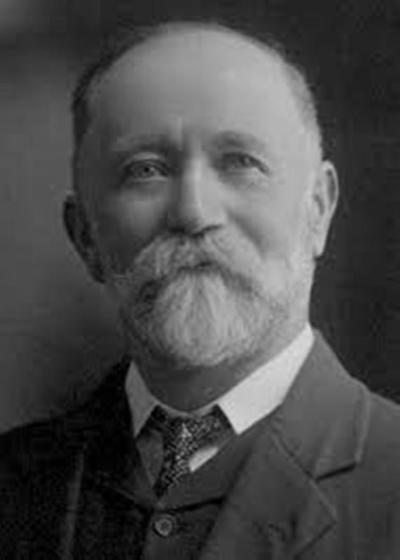
SPENCE, WILLIAM GUTHRIE (b. Eday, Orkney Islands, Scotland, 7 Aug 1846; d. Terang, Vic, 13 Dec 1926). Trade unionist, politician, and Methodist local preacher.
The son of a stonemason father (James Maxwell Spence) and a deeply religious mother (Jane Guthrie Spence), W G Spence migrated to Australia with his family early in 1852. After spending their first year in Geelong, the Spences became one of the pioneer families to settle the Ballarat-Creswick area.
As a small boy, Spence observed the Eureka uprising of 1854, and later maintained that it had a profound impact on his mature thought.
Equally important for his formative years were his experiences of marginal living as a shepherd, butcher-boy, shearer and miner. Largely self-taught, he became well-versed in the Bible and the classics, and in the political and economic thought of the day. In particular, he claimed to have studied Robert Blatchford, John Ruskin, Thomas Carlyle, William Morris, Edward Bellamy, Karl Marx, St Paul, and Jesus.
Spence is best known as the greatest union organiser in Australian history. It was in 1878, in the Clunes district near Creswick, that John Sampson and Spence revived an almost defunct miners' union (est 1874) that would shortly thereafter form the basis of the Amalgamated Miners' Association (AMA) of Vic.
He was the general secretary of the AMA in 1882, and the foundation president of the Amalgamated Shearers' Union of Australasia in 1886 (president, 1886-93).
Moreover, he was the principal founder in 1894 of the colony-wide Australian Workers' Union (AWU), of which he was the general secretary from 1894 to 1898 and president from 1898 to 1917.
Spence's only major setback as a union promoter came in the heady, difficult days of 1890, when he helped to precipitate the ill-fated maritime strike which broke out on 15 Aug in NSW and ended on 2 Nov 1890 with the workers, including those in his own union, soundly defeated.
Spence recovered from this reversal and quickly adjusted to the need to adapt labour to urban politics and strategies. He envisaged the AWU as the industrial wing of the newly formed labor party (est 1891, NSW), and threw himself into electoral politics.
Moving his headquarters from Creswick to Sydney in 1895, he served as a Labor member of the NSW Legislative Assembly from 1898 to 1901, when he was elected to the newly-constituted commonwealth House of Representatives (MHR for Darling, NSW, 1901-17 and for Darwin, Tas, 1918-9). He was Postmaster-General in the Andrew Fisher (ALP) cabinet, 1914-5, and Vice-President of the Executive council in 1916-7 under Hughes.
In the Labor Party conscription crisis of 1916-7, Spence was ill and, according to his daughter Gwynetha, was tricked by Hughes and others into supporting conscription. Because of his declining health and years of honourable service to trade unionism, Spence was the only Labor politician allowed to resign instead of being expelled for his action.
After serving Darwin as a Nationalist Party member, he was defeated in a bid for the seat of Batman, Vic, in the 1919 election, and retired from politics a disappointed man.
Public and Union
Spence's long record of public service and union activities were founded on his evangelical Christian faith. His mother taught him to read from the Bible before he was six and took him with regularity to the St Andrew's Presbyterian Church in Creswick as a child. Nurtured on the Westminster Confession of Faith, he became a lay leader and Sunday school superintendent of his church in the period before 1883. On 20 June 1871, Spence married Ann Jane Savage, a native of Derry, Ireland, and
a fellow Presbyterian, in the church manse in Creswick. However, apparent Presbyterian indifference to the plight of the Creswick area miners, especially at the time of the Creswick Australasian Mine disaster of December 1882, when 22 miners perished, led Spence to break with the Presbyterians and join the Primitive Methodists.
Shortly after the Australasian tragedy, Spence's name appeared on the rolls of the Primitive Methodist Church as a local preacher, and he soon was in demand as an evangelistic and inspirational speaker in Primitive Methodist, Wesleyan and Bible Christian churches in Vic and NSW. Because of a longstanding commitment to working class causes, Primitive Methodists were especially warm in their support of Spence's union activities, and large numbers of miners and shearers were themselves Methodists in background and belief. Further, Spence's church pulpit experience was invaluable to him as a union recruiter and political leader.
Spence's evangelical faith was also the basis of his civic-mindedness prior to leaving Creswick in 1895. Not only was he active in the local churches, but he was also a leader of the Creswick Sunday School Union and the Creswick Temperance Society, a regular participant in the town debating society and the local self-improvement society, a borough councillor, a justice of the peace, and a member of the area militia and the Creswick Havilah Lodge.
Christian Faith
Likewise, his Christian faith was the foundation of his trade unionism. In an era when Social Christianity was still widely embraced by postmillennial evangelicals, Spence almost effortlessly made the connections between the teachings of Jesus and his populist-socialist ideals. His political rhetoric was also that of the nineteenth century revivalist. Unashamed of his allegiance to Christ, Spence frequently spoke from the union political platform of his debt to Jesus.
Thus, on 23 May 1892, at a crowded public meeting at Bourke, Spence declared: 'Individualism has brought the worst and most selfish natures in humanity to the front. The New Unionism is simply the teachings of that greatest of all social reformers, Him of Nazareth, whom all must revere'.
Few Australian union leaders and Labor politicians were as well-known personally by so many people and so well-liked as W G Spence. Honest, genial and imperturbable, he lived a consistently godly life to the end of his days. In the last few years of his life, according to family members, he dabbled in spiritualism - as did many Christians of that era, especially those, who, like Spence, had lost a son in World War One.
He also died largely disillusioned with people, politics and organised religion. However, this did not diminish his commitment to humanitarianism, the principles of the Labor Party, or the teachings of Jesus Christ.
Spence succumbed to pulmonary oedema at his son's home in Terang, Vic, not far from Creswick, on 13 Dec 1926, and was buried without fanfare or public acclaim in the Coburg Cemetery, Melbourne. His wife, Ann Jane Spence, died shortly thereafter on 12 Dec 1927, and was laid to rest beside him.

Graham McDonald is the President of Diduno